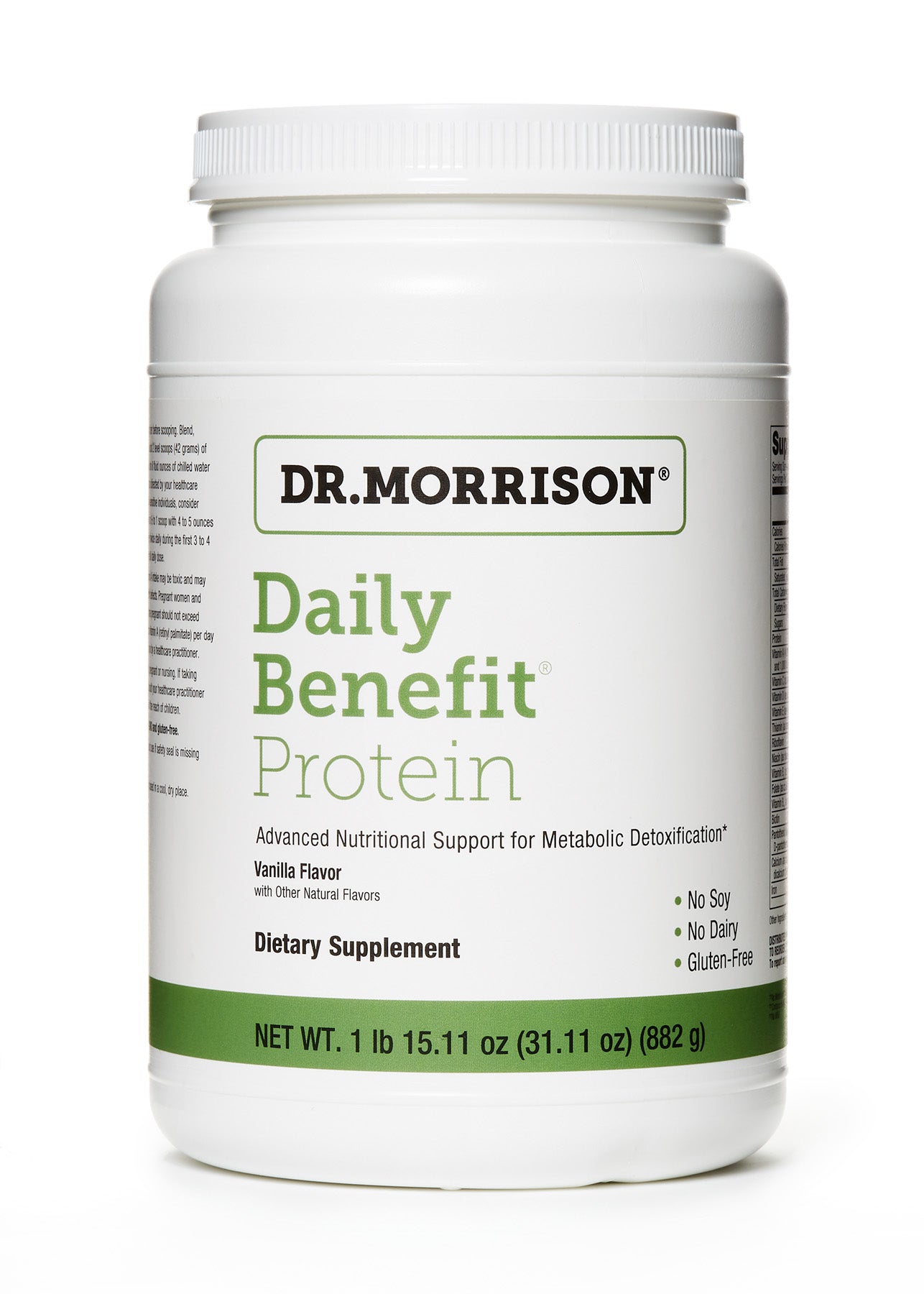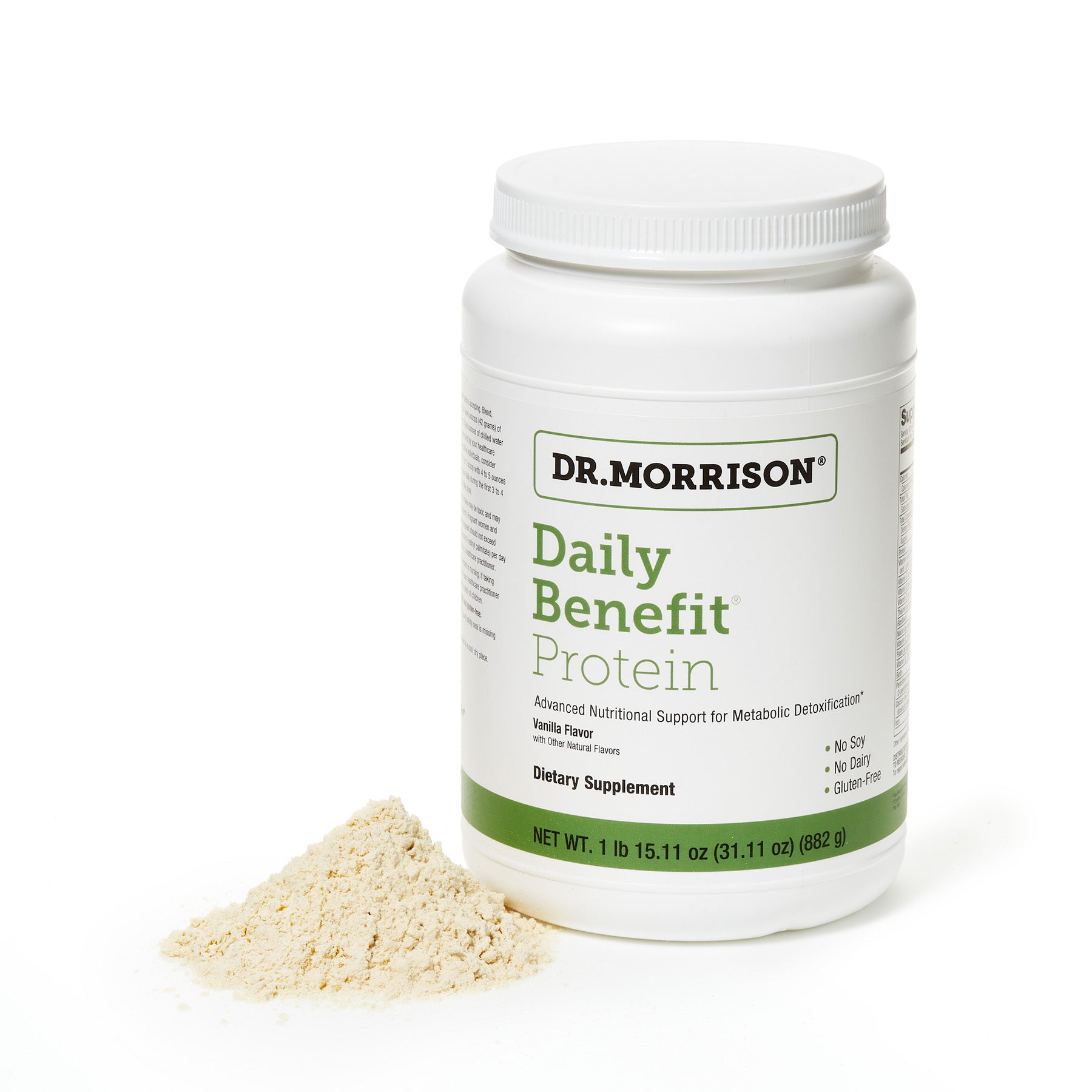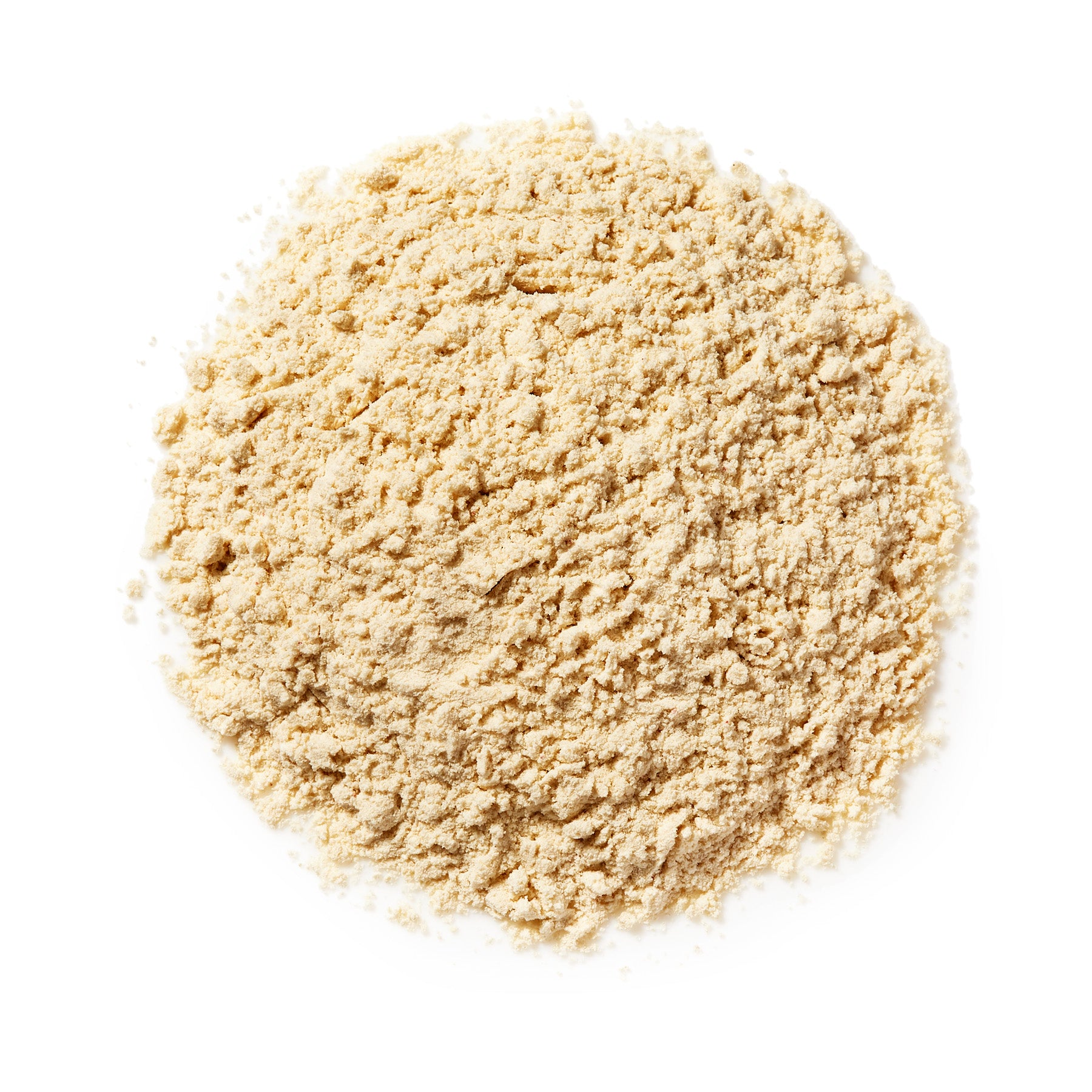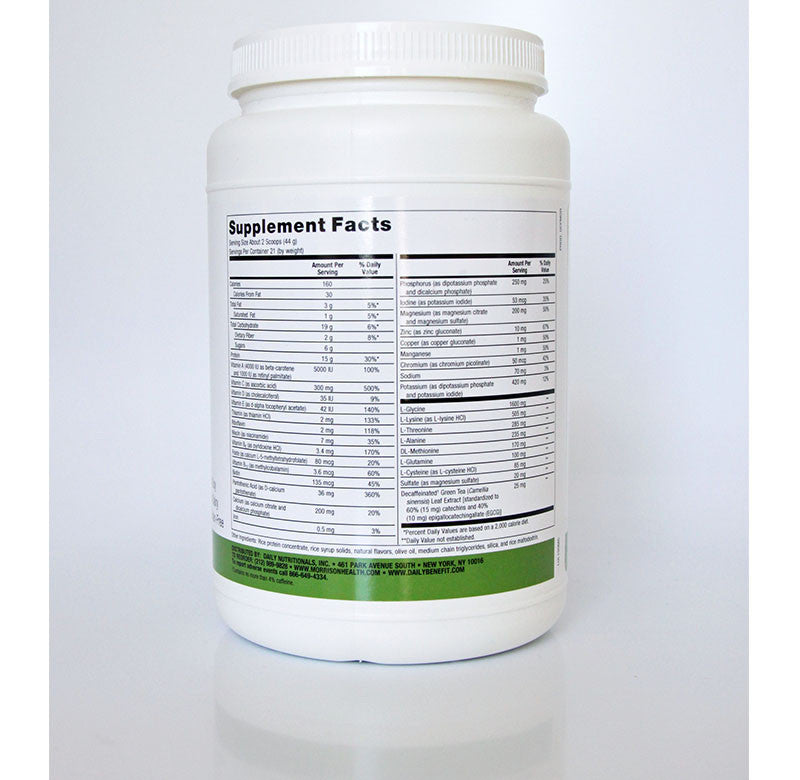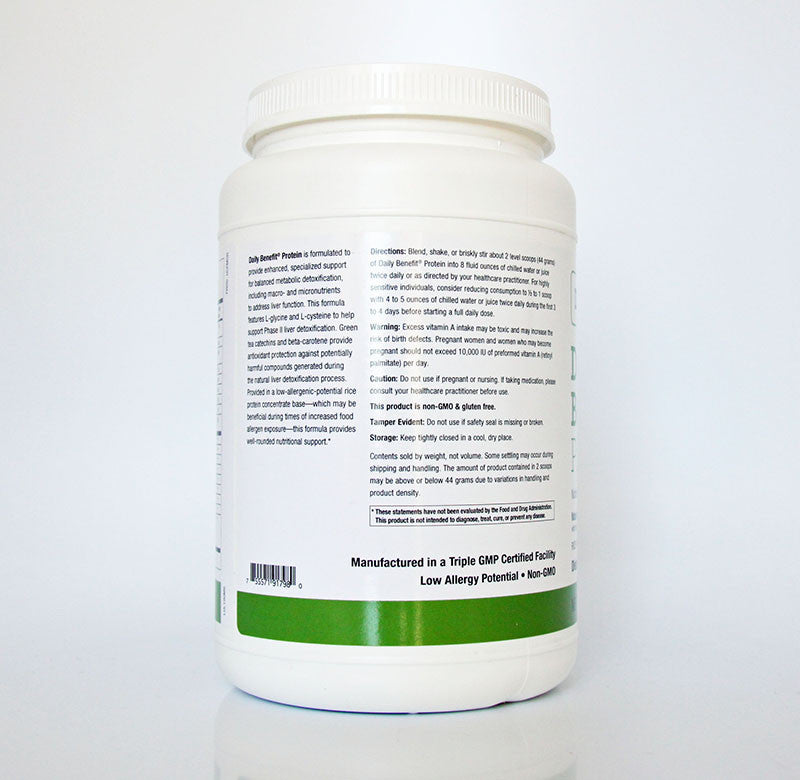Daily Benefit Protein
$ 100.00
Size: 31.11 oz (882g)
Specialized Protein-Rich Nutritional Support for Liver Detoxification and Metabolic Maintenance*
Daily Benefit Protein is formulated to provide enhanced support for balanced metabolic detoxification, including macro- and micronutrients for optimal liver function. Dr. Morrison’s popular formula is like a multivitamin, multimineral, and protein supplement all together in a satisfying shake–everything you need for a highly nutritious meal.
Product Highlights:
- 15g of High-Quality Vegan Protein Per Serving
- L-Glycine, L-Cysteine and Sulfur: Support for Phase II Liver Detoxification*[1,2]
- L-Lysine and L-Arginine: Immune System Support*[3]
- DL-Methionine: Support for SAMe Production and a Healthy Mood*
- Green Tea Extract and Beta-Carotene: Antioxidant Protection for Phase I Detox*[4]
- Cocoa Polyphenols: Glutathione Support for Phase I & II Detoxification*[5]
- Methylated B Vitamins: Macronutrient Metabolism and Brain Health*
Our need for protein increases when we are under stress or exposed to toxins, such as pesticides and chemicals in food and water. Our phase I and II liver detoxification systems need adequate protein and optimal nutrition to effectively eliminate toxins from the body and keep us healthy. Daily Benefit Protein provides high-powered, well-rounded nutritional support with a comprehensive vitamin and mineral blend so you can feel your best while you detox.*
*These statements have not been evaluated by the FDA and are not intended to treat or cure any disease.
You’ll enjoy Daily Benefit Protein if you…
- Want an easy, healthy, protein-rich, vegan meal option
- Could use more energy
- Would like better focus, concentration and endurance
- Want to lose weight
Our patients love Dr. Morrison’s Daily Benefit Protein because…
- It’s convenient, tastes great, and provides an easy, no-hassle breakfast or on-the-go meal. Try it for yourself!
- 100% Vegan, Gluten-free, Dairy-free & Low-Allergenic
- Highly Digestible
- Low-Carb
- Tastes Great
- Dissolves Easily in Water or Liquid of Your Choice
2 SCOOPS (42 g) PER SERVING
Vitamin A (80% as beta-carotene) 1,500 mcg
Vitamin C (as ascorbic acid) 300 mg
Vitamin D (as cholecalciferol) 0.8 mcg (35 IU)
Vitamin E (as d-alpha tocopheryl acetate) 28.1 mg
Thiamin (as thiamin HCl) 2 mg
Riboflavin 2 mg
Niacin (as niacinamide) 9.5 mg
Vitamin B6 (as pyridoxine HCl) 3.4 mg
Folate (as calcium L-5-methyltetrahydrofolate) 135 mcg DFE
Vitamin B12 (as methylcobalamin) 3.6 mcg
Biotin 135 mcg
Pantothenic Acid (as calcium D-pantothenate) 36 mg
Calcium (as calcium citrate and dicalcium phosphate) 200 mg
Iron 0.5 mg
Phosphorus (as dipotassium phosphate and dicalcium phosphate) 250 mg
Iodine (as potassium iodide) 53 mcg
Magnesium (as magnesium citrate and magnesium sulfate) 200 mg
Zinc (as zinc gluconate) 10 mg
Copper (as copper gluconate) 1 mg
Manganese 1 mg
Chromium (as chromium picolinate) 50 mcg
Sodium 70 mg
Potassium (as dipotassium phosphate and potassium iodide) 420 mg
Protein 10 g
Glycine 1.6 g
L-Lysine (as L-lysine HCl) 505 mg
L-Threonine 285 mg
L-Alanine 235 mg
DL-Methionine 170 mg
L-Glutamine 100 mg
L-Cysteine (as L-cysteine HCl) 85 mg
Decaffeinated† Green Tea (Camellia sinensis) Leaf Extract [standardized to 60% (15 mg) catechins and 40% (10 mg) epigallocatechin gallate (EGCG)] 25 mg
Sulfate (as magnesium sulfate) 20 mg
Other Ingredients: Rice protein concentrate, rice syrup solids,no MSG natural flavors, olive oil, medium-chain triglycerides, silica, and rice maltodextrin.
Blend, shake, or briskly stir about 2 level scoops (42 grams) into 8 fluid ounces of water twice daily or as directed by your healthcare practitioner.
Warning: Excess vitamin A intake may be toxic and may increase the risk of birth defects. Pregnant women and women who may become pregnant should not exceed 10,000 IU of preformed vitamin A (retinyl palmitate) per day unless instructed to do so by a healthcare practitioner.
Caution: Do not use if pregnant or nursing. If taking medication, please consult your healthcare practitioner before use.
Effects of lysine-arginine association on immune functions in patients with recurrent infections
Combined L-lysine-L-arginine therapy is capable of inducting recovery in age-related decline of thymic activity in mice and in elderly humans. The clinical usefulness of the association has also been shown in children with recurrent respiratory infections, while an increase in the number of CD3+ lymphocytes has been shown in patients with chronic lymphatic leukaemia. Recently, in vitro effects of the association on neutrophil function have been reported. In particular, the association was able to increase random migration, chemotaxis, phagocytosis-associated- and f-MLP-induced chemiluminescence. In this paper the authors evaluate the effects of L-lysine-L-arginine combination (lisargin) on several humoral and cell-mediated immunologic parameters in patients with recurrent infection. An increase of neutrophil random migration and chemotaxis (evaluated by a new technique, based on a computer assisted image processing system) was found. Furthermore an increase in the absolute number of lymphocytes involved in cytotoxic activity and IgG levels was observed.
Background: Aging is associated with oxidative stress, but underlying mechanisms remain poorly understood.
Objective: We tested whether glutathione deficiency occurs because of diminished synthesis and contributes to oxidative stress in aging and whether stimulating glutathione synthesis with its precursors cysteine and glycine could alleviate oxidative stress.
Design: Eight elderly and 8 younger subjects received stable-isotope infusions of [2H(2)]glycine, after which red blood cell (RBC) glutathione synthesis and concentrations, plasma oxidative stress, and markers of oxidant damage (eg, F(2)-isoprostanes) were measured. Elderly subjects were restudied after 2 wk of glutathione precursor supplementation.
Results: Compared with younger control subjects, elderly subjects had markedly lower RBC concentrations of glycine (486.7 ± 28.3 compared with 218.0 ± 23.7 μmol/L; P < 0.01), cysteine (26.2 ± 1.4 compared with 19.8 ± 1.3 μmol/L; P < 0.05), and glutathione (2.08 ± 0.12 compared with 1.12 ± 0.18 mmol/L RBCs; P < 0.05); lower glutathione fractional (83.14 ± 6.43% compared with 45.80 ± 5.69%/d; P < 0.01) and absolute (1.73 ± 0.16 compared with 0.55 ± 0.12 mmol/L RBCs per day; P < 0.01) synthesis rates; and higher plasma oxidative stress (304 ± 16 compared with 346 ± 20 Carratelli units; P < 0.05) and plasma F(2)-isoprostanes (97.7 ± 8.3 compared with 136.3 ± 11.3 pg/mL; P < 0.05). Precursor supplementation in elderly subjects led to a 94.6% higher glutathione concentration, a 78.8% higher fractional synthesis rate, a 230.9% higher absolute synthesis rate, and significantly lower plasma oxidative stress and F(2)-isoprostanes. No differences in these measures were observed between younger subjects and supplemented elderly subjects.
Conclusions: Glutathione deficiency in elderly humans occurs because of a marked reduction in synthesis. Dietary supplementation with the glutathione precursors cysteine and glycine fully restores glutathione synthesis and concentrations and lowers levels of oxidative stress and oxidant damages. These findings suggest a practical and effective approach to decreasing oxidative stress in aging.


